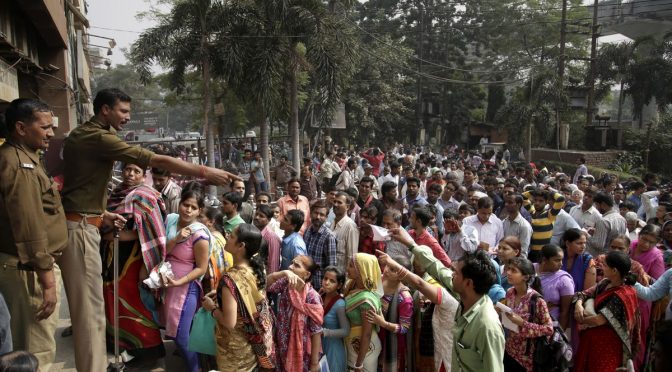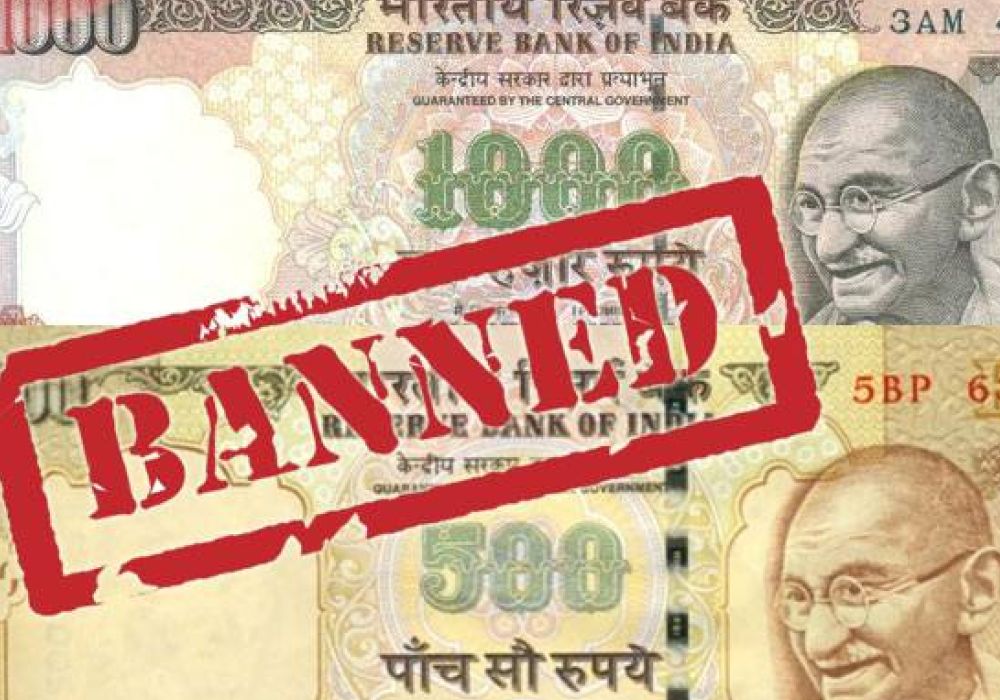Picture above: Nearly 40 deaths – including suicides, cardiac arrests in long queues, hospital casualties and a murder in a fit of rage in the first few days of India's demonetisation. The move caused a huge cash crunch in the country and turned life upside down for the lower middle class and poor families in India.
[Prout Globe, December 2016] – The demonetisation of 500 and 1000 rupees banknotes a month ago in India has raised pertinent questions about Indian government policies on corruption. In the short term, the sudden and previously unannounced move may have shocked and disturbed the criminal rackets: counterfeiting of banknotes and the flow of black money in the country, rampant corruption, the use of drugs, smuggling, etc. The long-term effects of demonetisation policy remain to be seen.
"While fighting corruption there should be a constructive ideal."
However the immediate effect of demonetisation has also been utterly disastrous for the people of India. A universal inability to pay for goods and services has brought the country to a standstill and near-collapse. The lives of ordinary people, small businesses, agriculture, and transportation have been thrown in greater chaos than ever.
Cause and symptoms
The science of medicine says that in order to cure a disease, its causes and not its symptoms must be addressed. In this particular case it seems that the government of India has determined that bank notes are the cause of corruption, black money, and counterfeiting allegedly used by terrorists to destabilise the country, etc.
According to PROUT, if corruption in the form of black money is to be treated at its root, it should be done via the taxation system. PROUT advocates a system of taxation where individual income tax is abolished and essential commodities are tax-free. Taxes should be levied at the starting point of the production of each taxable commodity and be paid directly by the consumers of such products. PROUT founder Shrii Prabhat Rainjan Sarkar suggested:
“If income tax is abolished and excise duty on excisable commodities is increased by only 10%, there will be no loss of government revenue. When there is no income tax, nobody will try to accumulate black money. All money will be white money and as a result there will be economic solidarity, an increase in trade and commerce, more investment, more employment and an improvement in the position of foreign revenue.”*
Some historical examples
“The best system of taxation was in vogue in the ancient Hindu Age. In those days only twenty-five percent of the entire produce was given to the king as taxes. The farmers could also give cows, horses or sheep as taxes. In such a system farmers did not face any inconvenience. Today, however, farmers face much inconvenience because they have to pay their taxes in cash. Farmers cannot always arrange cash by selling agricultural produce, because a proper market does not always exist.
“According to PROUT, a certain percentage of the farmers produce should be collected as direct taxes. It is also convenient for the government to realize taxes in the form of goods, because it needs to store produce as insurance against future contingencies. Taxes in such a form can easily be distributed from government stores when the people are in need. Moreover, this system will easily meet the requirements of people in the towns and cities. Such a system can rapidly transform the Indian economy.”**
“To overcome the great famine that struck Bengal in 1943, the Wavell administration introduced a rationing system. Wavell also tried to alleviate the famine by restricting the movement of food from one province to another. But these measures did not solve the problem – rather most people became trapped in the food rationing system.
“Even after the departure of the British in 1947, about 145,000 people were included in the rationing system. This resulted in the gradual increase of black marketeering, profiteering and other corrupt practices. The central government suddenly abolished the food rationing system in an attempt to solve the problem of corruption. This precipitous step caused the price of food to rise to exorbitant heights. Later the food rationing system had to be reintroduced.
“The Indian leaders tried to solve this food problem by calling for a “grow more food” campaign, but the campaign was a failure because the system of agriculture was not changed to increase output. The government adopted the policy of increasing the area of arable land and not the productivity of the existing land. There was no planning to determine whether or not the new land was suitable for agriculture, and no proper irrigation facilities to improve productivity.
“But above all, in the democratic system bureaucrats had ample scope to neglect their responsibilities, and due to defective administration much agricultural potential was wasted. Consequently, dishonest traders conspired to make the agricultural sector ineffective. They perpetuated the food problem to satisfy their own selfish interests. So from all points of view the agricultural system in India is extremely weak.”***
Conclusion
Banknotes are physical objects and cannot themselves be the cause of corruption. Neither can they be described as its symptoms. It is the illegal handling of banknotes that may be viewed as symptoms of corruption. The cause or causes of such corruption are yet to be named properly by the government of India.
PROUT stands for rational distribution, development and maximum utilization of all the resources of this world – physical, mental and spiritual – all has to be taken care of. This theory will create harmony and peace in the society, a society where exploitation and corruption will not exist.
This means that corruption is the result of greed, mean-mindedness, and selfishness. In order to cure a society and its members of such a severe disease, PROUT advocates the practical application of firm principle as a short-term measure, and the cultivation of deep humanism and spirituality as a long-term measure.
“While fighting corruption there should be a constructive ideal. Different civic movements in India have failed to give benevolent service because they lacked a constructive ideal. They fought only for the sake of fight. Therefore it is necessary that the ideal should be first, the ideal second and the ideal always.
“Those who lack a constructive ideal help the capitalists in their exploitation. Only criticizing capitalism will not be of any service to the people, rather it will help the antisocial elements to find or invent more tactics for exploitation. This is the condition in India today. The leftist groups are engaged in criticizing the capitalists, which is bearing no fruitful results, and the capitalists have captured power by influencing the ruling party.****
Only a radical re-orientation of human aspirations and efforts towards truly great individual and collective goals will succeed in rooting out corruption for good and will introduce a moral and spiritual society for all and not only for a few.
Notes
* “Some Aspects of Socio-Economic Planning,” P.R. Sarkar, Prout in a Nutshell Part 15
** “Agrarian Revolution,” P.R. Sarkar, A Few Problems Solved Part 2
*** “Agrarian Revolution,” P.R. Sarkar, A Few Problems Solved Part 2
**** P.R. Sarkar, Discourses on Prout 2



Surely these are the good remarks in the Prout Theory. But can any one find Shabad Chayanka part IV and X where some of the references are given in expalining the same that is keep wagons moving and keep money rolling. Thanks and looking forward.
Hello Rajesh Kumar,
According to Prout founder Shrii P.R. Sarkar, in order to keep "the wagons moving" and the money rolling it is necessary firstly to curb accumulation and secondly to keep the amount of issued money relevant to the value of bullion (gold) of the treasury. This is related to (1) PROUT's first fundamental principle and (2) the adherence to a gold standard. India's PM Modi's recent move to demonetize and print fresh bills is perhaps intended as a move against corruption plus regaining control of utilization of money bills. Modi's government has so far not dealt with the issue of accumulation and say gallopping inflation.
– Eds
Your solution to corruption is to promote spirituality. That is impractical. No wonder Prout is nowhere.
The real solution was already mentioned by Sarkar as a taxation and redistribution system that allows payment by kind.
First you set up an organization in a small town that has an agreement with the local government and business associations to collect local taxes in kind such as 10% sales tax.
Then that organization warehouses some of the tax payments and gives some to the local government’s operations and projects.
That organization can earn by selling the warehoused produce at a profit whenever a market exists, then remitting the net cash to the government.
This frees the tax payer from finding a market and frees the government from the cost of warehousing.
I don’t understand why Proutists have never acted to implement Sarkar’s system and just take the easy way of just writing about it.
Hello J,
The measure kindly suggested by you is mentioned early in the article followed by other practical initiatives. The remark towards the end on morality and spirituality is integral to Prout.
Best wishes,
The editors